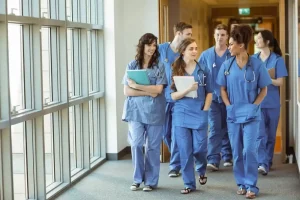What do junior (now called ‘resident’) doctors do?

This is a surprisingly difficult question to answer – even though they do alot, and are a crucial part of the NHS.
There are more than 50,000 ‘junior doctors’ in England, who make up almost half the doctors in hospitals. It is not a great term, as many are not ‘junior’ at all. The name covers those who are fresh out of medical school through to others who have a decade of experience behind them.
For this reason the roles of less and more experienced junior doctors are quite different.
Less experienced junior doctors (called ‘F1/2s’, and ‘SHOs’) – in first five years after qualification
These are some of their typical jobs.
- Writing in the patients’ notes on ward round
- Following orders from senior doctors (registrars, see below; and consultants) on ward rounds
- ‘Clerking’ (assessing patients and documenting that history, examination, and plan in their notes)
- Writing drug charts (what drugs the patient is having)
- Requesting blood tests
- Requesting imaging scans (and chasing reports of scans)
- Making referrals to other departments
- Writing discharge summaries
- Talking to relatives and answering their phone calls
- Carrying out small procedures like blood sampling, IV cannulation or urinary catheter insertion
- Documenting everything in the notes (that may be an online electronic patient record, EPR).

More experienced ‘junior doctors’ (called registrars) – in the second five years after qualification
Even though these doctors are often called ‘junior’, they are not. It is a misnomer. MyHSN prefers to call them ‘doctors in the middle of training’ (i.e. to be a consultant or GP).
Anyway. Registrars work as deputies to the consultants but are leaders in their own right. The work is very variable and is a combination of:
Hospital inpatient work
- Reviewing newly admitted patients (especially the most unwell patients) who have been ‘clerked’ by less experienced junior doctors (see above)
- Providing care for patients who have developed an illness whilst admitted for another reason (such as a surgical operation)
- Taking phone calls from GPs
- Work is typically based in either:
Outpatient work in a clinic, procedure area or operating theatre
- Being trained in and carrying procedures (and operations, if they are a surgeon)
- Teaching and supervising other junior doctors and medical students.
There are also GP registrars, who you may see if you go to your GP.
Summary
We have described what do junior/resident doctors do. It is very variable. We hope you understand it better now.

